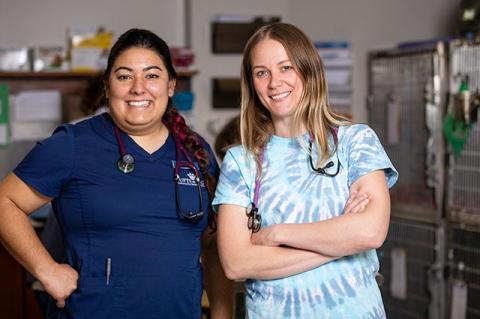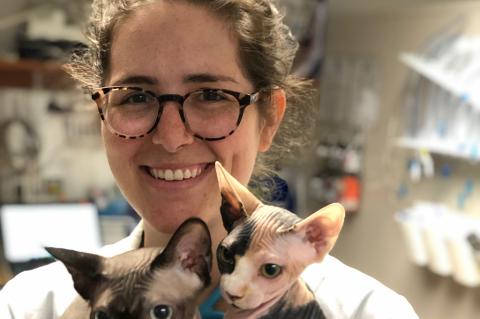-
About
- Leadership & Faculty
- News & Events
-
Academics
- Graduate
- Advanced Clinical Training
- Continuing Education
-
Student Life
-
Research
-
Hospitals & Clinics
- Emergency Care
- Hospital Services
-
Community Outreach
- Volunteer
Shelter Medicine Program
Vision
To educate, inspire and prepare veterinarians to better understand the unique needs of vulnerable animals and the people who care for them while working towards broader social change.
Mission
The Shelter Medicine Program at Cummings School blends our strengths in patient care, research, and service-learning to care for underserved animals in our community while providing hands-on learning opportunities to veterinary students.
Explore the Program
Program News

Shelter Medicine Advocate and Leader
Alumna Chumkee Aziz V12 helps shelter medicine grow through education and promotion

Community Medicine Keeps Pets Out of Shelters
Jane Waterfall, V18, and Kayla Sample were the first two community medicine interns at the Tufts at Tech veterinary clinic in Worcester. Here’s what they learned.

Finding Fulfillment in Shelter Medicine
A longstanding love of animals led Adrian Dannis, V20, to discover a rewarding career—and herself
In Our Own Words
The Shelter Medicine Program at Cummings School of Veterinary Medicine at Tuft University addresses the needs of underserved animal populations while teaching students practice-ready skills. For the portion of our students who anticipate careers in animal welfare, our program offers unique opportunities to get specialized instruction and hands on experience while in veterinary school. The underserved animals that we focus on include free-roaming cats, homeless animals and those at risk for relinquishment, including those pets that may be living with economically disadvantaged owners. We believe that by caring for animals in need, we are also sensitizing the next generation of veterinarians to animal welfare concerns and empowering them to give back with compassion throughout their careers.
Dr. Emily McCobb Clinical Associate Professor of Anesthesiology, Director, Shelter and Community Medicine, Assistant Director Center for Animals and Public Policy
Cummings School Shelter Medicine program provides a broad and deep foundation for veterinary students to learn the context of animal sheltering in society, health & welfare issues of homeless and at-risk animals as well as the importance of community medicine programs to prevent future animal suffering. Whether these students go on to work or volunteer in animal shelters or accessible veterinary medicine clinics or not, they emerge from this program with a solid understanding of the complexities of keeping all pets safe and healthy in all communities.